Please tell us which country and city you'd like to see the weather in.

Thum
Thum is a small town in the district of Erzgebirgskreis, in the Free State of Saxony, Germany. Thum has a population of about 5800.
Geography
Thum is situated in the Erzgebirge, 10 km northwest of Annaberg-Buchholz, and 19 km south of Chemnitz. The Jahnsbach, a tributary to the Zschopau River runs through the town. To the north is Gelenau, east is Drebach, south of Thum is the town of Ehrenfriedersdorf. The Greifensteine area lies to the south west, and Hormersdorf and Auerbach are to the west.
History
Thum was first mentioned 1389 in historic records of the archdiocese of Prague. From the 14th century, mining in the once densely forested Erzgebirge steadily increased, and a history book of 1445 describes Thum as a small mining town. Several placer deposits, two stamp mills and 27 mines were in the area of Thum. Considerable amounts of Axinite were found, which initially was given the name Thumit. In 1469 the citizens of Thum acquired township.
The last battle of the Thirty Years' War in Saxony was fought on January 15, 1648 near Thum. The destruction caused by the war resulted in mining no longer being sustainable. With the run-down of ore-mining in the area, Thum (like many other towns and villages in the Erzgebirge) turned to wooden toy manufacture - such as Schwibbogen and Christmas pyramids - as well as "klöppeln" as a matter of economic survival. In the 18th and 19th centuries, the textile industry was the main source of income for Thum.

Hunza Valley
The Hunza (Burushaski and Urdu: ہنزہ) is a mountainous valley in the Gilgit–Baltistan region of Pakistan. The Hunza is situated north/west of pakistan.
History
Hunza was formerly a princely state bordering Uyghurstan to the northeast and Pamir to the northwest, which survived until 1974, when it was finally dissolved by Zulfikar Ali Bhutto. The state bordered the Gilgit Agency to the south and the former princely state of Nagar to the east. The state capital was the town of Baltit (also known as Karimabad); another old settlement is Ganish Village. Hunza was an independent principality for more than 900 years. The British gained control of Hunza and the neighbouring valley of Nagar between 1889 and 1892 through a military conquest. The then Mir/Tham (ruler) Mir Safdar Ali Khan of Hunza fled to Kashghar in China and sought what would now be called political asylum.
First Muslim Mir/Tham
Mir/Tham
The traditional name for the ruler or Prince in Hunza was Tham (also Thom or Thum), which is also a respectful greeting used by the people of both Hunza and Nager who belong to the clan of Boorish. The Shin use the term Yeshkun for the Boorish.
Radio Stations - Thum
SEARCH FOR RADIOS
Podcasts:

-
by Theme
-
by Theme
-
by Theme
-
by Theme
-
by Theme
-
by Theme
-
by Theme
-
by Theme
-
by Them
-
by Them
Das Amt
by: ThemeSo meine Herrschaften, darf ich jetzt bitten?
und alle Beamten singen mit...1....2....3
Refrain:
Wir sind das Amt,
wir sind Beamte,
wir sind allzeit für sie da von 9 bis 3,
wir sind der Staat,
sind seine Diener,
die Tür ist auf schaun sie bei uns doch mal vorbei
Wenn sie kommen kommen sie nicht gleich am Montag,
denn am Montag können wir für sie nichts tun.
Denn nach dem langen Wochenende, braucht man ein bisschen Zeit sich auszuruhen.
Und auch Dienstag, ist nicht günstig, wir besprechen ein Projekt,
Dabei trinken sie dann gerne 2,3 kleine Gläschen Sekt
Refrain:
Wir sind das Amt,
wir sind Beamte,
wir sind allzeit für sie da von 9 bis 3,
wir sind der Staat,
sind seine Diener,
die Tür ist auf schaun sie bei uns doch mal vorbei
Nur am mittwoch tut uns leid da sind wir leider,
alle nicht so richig für sie da.
Da besprechen die den ganzen Tag noch einmal,
was am Dienstag Abend war.
Doch am Donnerstag da geht es,
aber kommn sie nicht zu spät,
weil die Frühstückspause Donnerstags,
schon mal bis Dienstschluss geht.
Refrain:
wir sind das Amt,
wir sind Beamte,
wir sind allzeit für sie da von 9 bis 3,
wir sind der Staat,
sind seine Diener,
die Tür ist auf schaun sie bei uns doch mal vorbei
Doch am Freitag wär es wirklich, ganz besonders, großer Mist
weil am Freitag 10 Uhr Mittags, für Beamte praktisch Wochenende ist.
Doch an allen andern Tagen, stehen wir gern für sie bereit.
Und zwar mit allem was wir haben, mit Kompetenz und Höflichkeit. Genau!
Refrain:
wir sind das Amt,
wir sind Beamte,
wir sind allzeit für sie da von 9 bis 3,
wir sind der Staat,
sind seine Diener,
die Tür ist auf schaun sie bei uns doch mal vorbei
Jetzt einen ganzen Ton höher!
Refrain:
wir sind das Amt,
wir sind Beamte,
wir sind allzeit für sie da von 9 bis 3,
wir sind der Staat,
sind seine Diener,
die Tür ist auf schaun sie bei uns doch mal vorbei
Wir sind das Amt,
wir sind das Amt!
